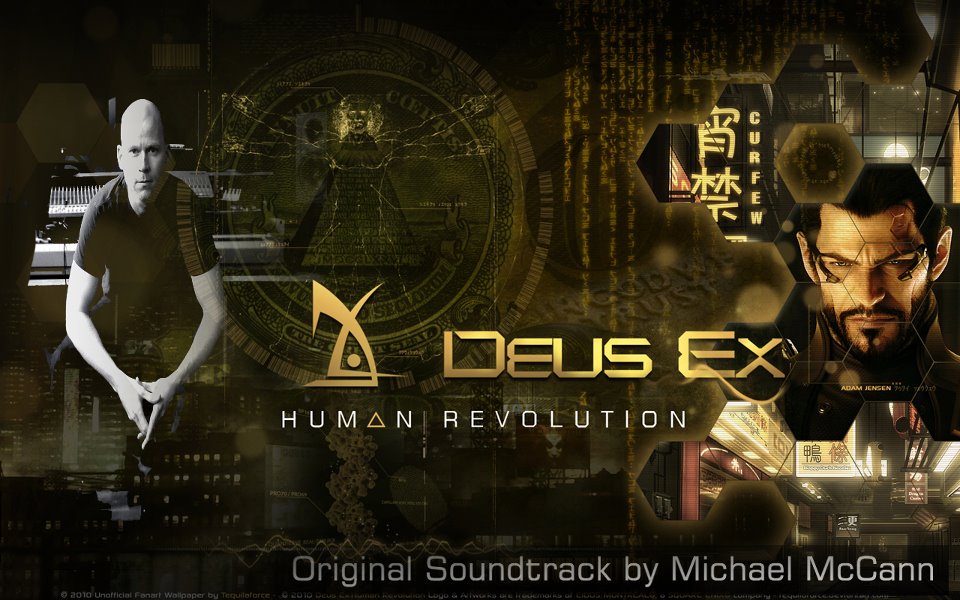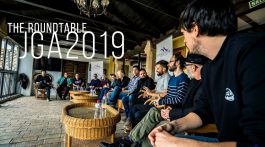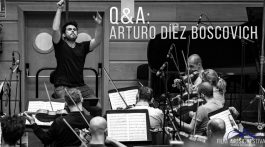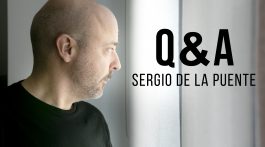
|
Michael McCann and his musical revolution He has revolutionized Internet with his theme «Icarus», a first class musical accompaniment for the trailer of Deus Ex: Human Revolution, third installment of the series and videogame, probably the game of the year, with permission of Batman: Arkham City. Michael McCann is the composer of this superb piece of cyber-punk engineering. Bsospirit: Hi Michael. Thank you very much for this interview. Let’s begin with the first question. After a productive career as a producer, sound engineer and composer, how it happened that you began to get interested into the audiovisual medium? And when did you decide that this industry was going to be a way out for your creativity? Michael McCann: I started a band with some friends when I was about 13. It only took a few live shows for me to realize I didn’t like performing in front of an audience. I really felt that music was too personal to share with an audience in a live setting. I also felt, at least in the early ‘90s, that music had become a vehicle for delivering words. Instrumental music was very unpopular and virtually non-existent. It seemed that audiences and bands were forgetting how to convey an idea through music without using lyrics. A song about love and a song about war could sound exactly the same, the only thing that conveyed the intent of the song was what the singer was expressing through lyrics. And if the instrumental side of the song had any connection to lyrics, it was through extreme clichés, like ‘distorted guitar for anger’ or ‘acoustic guitar for love’. So, fueled by a distaste for live performances and a yearning to compose instrumental music with depth, I started to explore soundtracks. They felt new for sale in the music world to me—unclaimed territories where I could delve into complex themes. The enchanting aspect of soundtracks is their ability to convey the essence of a film’s narrative without relying on dialogue or visuals. Even when paired with compelling imagery and performances, a soundtrack’s true mission is to underscore the profound subtext and abstract concepts that visuals alone may not fully convey. Soundtracks may often play a subtle role in the cinematic experience, but to me, they represent a pure form of musical storytelling, where ideas can be articulated through melodies and harmonies, without the accompaniment of lyrics. BS: In 2007, you got the attention of all the videogame community thanks to your excellent composition for one of the best infiltration games of recent years, «Splinter Cell: Double Agent.» How did you get involved in this project? MM: I had actually never done anything in the game industry when I started Splinter Cell: Double Agent. My agent at the time asked me to pitch about 5 minutes of music to Ubisoft back in 2005. There were quite a few other composers who were pitching, many with a lot more game experience than me, so I didn’t think I had much of a chance. But the pitch seemed to work, and I was hired very quickly after submitting. What interested me about that project was the audio director had very unique references for the music direction in the game. He cited Daniel Lanois, Brian Eno and Neil Young’s score for ‘Deadman’. The pitch I did actually had a very strong blues influence with very ambient slide guitar, acoustic drums, etc. I mixed it in with some traditional spy-genre musical elements, but it was a very unconventional pitch compared to the previous title’s music. Over the course of scoring the game the music obviously evolved, but I always kept the roots / acoustic feel all the way through even the Africa, China and Russia sections of the game. BS: 1.8 million downloads of this soundtrack. Did you expect that huge success? MM: Ya, I’m actually amazed by the amount of passion there is for game music. I’ve read interviews with a few composers that have moved from either film or TV into games saying that they’ve never received so much feedback for their work as they do in games. I still receive as many emails about the SC:DA score in 2011 as I did back in 2007. I think it also helps that much of the composition in that game was built like songs, with strong melodies and structure. I think that helps with the staying power of the music. Even though I’m really proud of the work on the score and spent a long time on the project, I never thought it would still be getting feedback back 5 years later. BS: Your song «Anywhere But Here» was used in 2008 as the opening theme for the television show «Regenesis.» How did begin this collaboration? MM: The first season of ReGenesis was actually back in 2003. Interestingly enough, the first season starred Ellen Page as the daughter of the main character – feels like a long time ago now. The track ‘Anywhere But Here’ was from an album I did back in 2001, under the name ‘Behavior’. The company doing the music supervision for ReGenesis had the album and approached me about using the track for the theme. It is a really great opening sequence for a TV show, inspired by some of HBO’s openings like Six Feet Under. Perhaps an interesting side story – the original track included a sample from an old David Axelrod song which was cleared for the album. But because the license to use it on the TV series would have been enormous, I rebuilt the entire track from scratch without the sample. I like the revised version better so it’s replaced the original version from the album now. The track was remixed for seasons 3 & 4 since they changed the opening visuals quite a bit but I’m still partial to the original season 1 & 2 opening. BS: In 2009 you become the composer of «The Foundation», a 5-episode television show. How did you join the production team? MM: The creator of that show, Michael Dowse, is a good friend who I’d done a lot of work with in the past. I’d been sound designer and music editor for his first 2 features, FUBAR, and It’s All Gone Pete Tong, but since he’s on the comedy side and I’m on the darker / dramatic side for music, I’d never thought I’d score one of his projects. The score for that show was actually a mix of jazz / swing / hip-hop, and strangely it worked. I’d never scored comedy before so it was an interesting challenge. Dowse is doing some pretty high profile films of late so as far as I know the show will just exist as a 5 episode single season. BS: Do you feel comfortable working on television series? Do you run well with the pressure of deadlines of this medium? MM: Ya, I’ve worked a lot in television. But the biggest test of deadline pressure was a project for Discovery Channel back in 2009. The show required 4.5 hours of music in 10 weeks. Earlier that year, I had been blown away after reading an interview with Sean Callery about his score for the series “24”. He was composing close to 40 minutes of music every episode, with 24 episodes a season. I was curious as to what that kind of schedule was like. For this reason, the Discovery show became a challenge to me. Although it was only a 6 part mini-series, I had to compose over 7 minutes of music every day, and you really have to learn to trust your instincts. There is no time for revisions, no time for redoing cues. Almost everything has to work the first time around. I really loved the pressure, but the music is obviously very impersonal. I would definitely prefer to approach the same schedule / pressure with a more dramatic / story-driven project. BS: Deus Ex: Human Revolution will be, without a doubt, one of the games of the year. It looks like a production made for you. Don’t you think so? MM: In the beginning I was a little nervous actually. I’m not a fan of synth-based music, and Deus Ex is based in the cyber-punk world where synth is the key musical element. Even coming from an electronic music background, I was always more drawn to bands / artists that created a hybrid of electronic / acoustic sounds; for example Massive Attack, Chemical Brothers, Amon Tobin, etc. What I like is that these artists will either sample from old acoustic songs or build sounds from acoustic sources and then process them into this very electronic world. The result is a very emotional and organic tone that feels much more personal to me than just synth-based music. The challenge then was to apply my own acoustic / electronic style to the world of Deus Ex: Human Revolution. In the end, you sometimes do get the traditional synth arpeggio or big resonant synth pad but everything is surrounded by acoustic textures, voices, big break-beat drums and as much organic instrumentation as possible. I think this hybrid really helps reflect the core theme in the story, which is a very strong conflict between nature and scientific progress. Nature is represented by acoustic sounds, science is represented by synthetic sounds, and then a hybrid of the two which represents a comprise of the two. The score drifts from one extreme to another throughout the game eventually ending with a strong electronic / acoustic hybrid towards the last 3rd of the story. BS: The trailer and your music for it have been a whole revolution in the Internet. Were you aware of the repercussions that this promo was going to have in terms of spreading your music? MM: To be honest, when I was working on the trailers they were almost entirely wireframe and void of any colour, texture or lighting. I didn’t actually see the final animation and CGI until the music was complete. I knew the trailer was going to be something insane, just based on the initial rough animation, and based on previous animation work from Visual Works in Japan (the animation team behind the Final Fantasy series) and the team at Gold Tooth Creative in Vancouver (who directed the whole trailer). However, when I saw the final visuals and music put together I literally jumped out of my seat. It was pretty amazing to see it all come together. We did a few different versions of that trailer, and I fully recommend the 5 minute ‘director’s cut’, as it combines all the visual / musical elements of all the various versions into one mega-trailer. {youtube width=»355″ height=»210″}Kq5KWLqUewc{/youtube} BS: Is the music for the game going to follow the same patterns you have used in making the music for the promo? MM: The music from the trailers is the main theme, and elements from that theme appear in different cues throughout the game for sure. However, this is a very long and very dialogue / story intense game, lasting anywhere from 25 – 40 hours, depending on the player. This means the music has to share space with many other elements. So although there are big cues throughout the game (combat music, cinematics, etc.) there is also a great deal of ambient music which just helps immerse the player in these very rich / large environments. The music really shifts from very minimal ambient pieces, to very aggressive combat pieces, to thematic story themes. BS: What kind of conceptual storyline elements from Deus Ex have you used more when writing the score? MM: I had the script, concept art, screenshots and some early gameplay video (which evolved as the project went on, of course). Out of all these elements, the most important for me was the concept art. I find, even above the script and gameplay video, the concept art is the most emotional and complete representation of what the game is meant to ‘feel’ like. Although there are times when I score directly to the story (cut-scenes, cinematics, etc.), for the most part I am scoring to the environment the player is in. Because the gameplay allows the player to explore environments for as much time as he / she wants, there are opportunities to spend a great deal of time in the game not directly interacting with the story. For this reason, scoring to the environments becomes very important, and it means looking at the grand themes within the story and applying them to each environment. So for each theme in the story (transhumanism, rebirth, conspiracy, etc.) there is a musical concept to go with it, and those concepts are built into the ambient music so that they are present in the music all through the game. This is something that is important in art direction as well, and this is the reason the concept art was so important. BS: Can you give us an overview of the whole process involved in writing the soundtrack for a video game? Were you involved in other departments such as sound engineering? MM: Creating this soundtrack was very different than when I did Splinter Cell: Double Agent. The music for SC:DA was built around melodies with the lead melody for each cue coming first, and then building the music around the melody. For DX:HR, the melody (if any) came last, with the foundation of the track (harmony, rhythm, textures, etc.) coming first. In the beginning there was a lot of experimentation with the music. The first cues were very electronic and very mimimal. You can still hear a lot of these ideas in the Detroit section of the game, which is the section I scored in 2008 / early 2009. When I started scoring Heng Sha, China the music became much more organic with a lot of traditional Chinese strings and percussion. This change in tone was a reflection of the story and the setting but it was also an experiment that really helped separate the dark / messy sound of Detroit from the more organic pieces in China. I did Tai Yong Medical much later in the project (spring of 2010) and because it is a daylight section of the game, the music shifts quite a bit again, becoming much more spiritual and airy. There are a lot of locations in the game and each one has its own sound. The process of creating the sound for each section was definitely borne out of experimentation. BS: According to the developers, the game is going to have a long duration. This also affects you? I mean, do you have to compose a lot of more music, is not it? MM: Yes, absolutely, but the amount of the music is also dependent on the music system in the game. Because it is a fairly old music system with very few layers to work with, the decision was made to use a lot of different pieces of music to help with repetition. In total there are around 200 pieces of music, one piece of music for almost every location in the game. In a city map like Detroit, there is a piece of music for the streets, the alleys, the medical clinic, the main headquarters (Sarif Industries), the sewers, the various apartment buildings, etc. Even in the police station there is different music depending on how you enter the building. For example, if you are given permission to enter the station, you’ll get different music than if you sneak in through the vents. BS: Would you be interested in composing music for films or do you think that there is more interesting projects in the TV and video game industries? MM: I’m interested in them all. I’ve worked a lot in all 3 media, and each has a different advantage for music. However, having done so much game / television / advertising work over the last few years, I really miss the personal and focused environment of movies. An analogy that I would use is that games and TV are like creating an entire city – where you’re looking at a huge area of land and all the buildings, streets, rivers, forests, bridges, neighborhoods all have to work together in this grand design. Films on the other hand, are like working on one single building in that city – where every stair, every room, every piece of glass is as important as a neighborhood or bridge. But because it’s smaller in scale, there is a much more controlled creative vision – a director whose mark is on everything, which can make it much more intimate. Hopefully that analogy works, but as much as I love the grand scale of television and games, there’s something I miss about the intimacy of movies. BS: Can you talk about your future projects? MM: Next project is vacation. BS: Thank you very much for your time, Michael, and good luck. |
Authors
BIOGRAPHY: Michael McCann’s (a.k.a. Behavior) award winning work as composer, producer and sound designer has been recognized and showcased worldwide. His broadcast and client resume includes some of the biggest companies in entertainment and advertising, including MTV, NBC, Ubisoft, Deutsch Inc., Eidos / Square Enix, Fox, Ogilvy & Mather, Alliance Atlantis, and more. (See portfolio for more details.) The last few years have resulted in McCann’s biggest successes. His critically acclaimed soundtrack for Tom Clancy’s Splinter Cell: Double Agent has amassed over 1.8 million MP3 downloads since early 2007. The soundtrack also received an IGN ‘Best Original Score’ Award, and 2 ‘Best Original Score’ nominations from the Academy of Interactive Arts & Sciences and G.A.N.G. Michael’s music editing and sound design work for the film It’s All Gone Pete Tong also earned him 2 Genie nominations; while the film went on to win 5 ‘Best Film’ awards including the Toronto International Film Festival (TIFF). Michael has composed advertising music for ‘Tom Clancy’s EndWar’ (Ubisoft), was composer for Michael Dowse’s new half-hour dark comedy series ‘The Foundation’ (Showcase), scored the indie film Burning Mussolini starring David Zayas (Dexter, Michael Clayton) and Peter Outerbridge (24, Lucky Number Slevin), and came out of 2009 scoring a 6-part mini-series for Discovery Channel. 2008 brought the last season of the 10-time Genie nominated series Regenesis, which uses Michael’s track Anywhere But Here as the opening theme. In August 2008 the music was nominated for ‘Best TV Theme’ at the 2008 Hollywood Music Awards. The awards show will be held on November 20th, at the prestigious Kodak Theater Complex in Hollywood – the same location as the Academy Awards. In June, Michael also scored 20 clips for the Canadian Space Agency, showcasing their incredible successes, including their major involvement with NASA on the Mars Phoenix landing this summer. Michael’s work continues into advertising, working with some of the top ad agencies in the world, including Ogilvy & Mather and Deutsch Inc. He has scored high profile ads from Old Navy, Rotary International (World Peace Ads), Alliance Atlantis (feature film trailers), as well as licensing a ton of music for shows and promos from MTV & VH1. Other highlights from Michael’s past include being sound-designer and music editor for the cult film FUBAR, which was Official Selection at the 2002 Sundance Film Festival. FUBAR screened in the festival’s prestigious ‘Midnight Screening’ that also launched The Blair Witch Project and Reservoir Dogs. Michael is also a long time collaborator with vocalist / songwriter Andrea Revel, who has appeared in almost every one of Michael’s projects. He produced her 2004 LP Citysong, as well as her 2007 cover version of Manu Chao’s ‘Clandestino’. Michael and Andrea’s extremely popular track Clap! Shake! Jump!, used in the 2006 Old Navy spring ads was just released as a full single on iTunes. Andrea also appears on the Splinter Cell: Double Agent soundtrack, the Regenesis opening theme, and Behavior’s 2001 debut, which was their first collaboration in 2001.
|








No hay comentarios